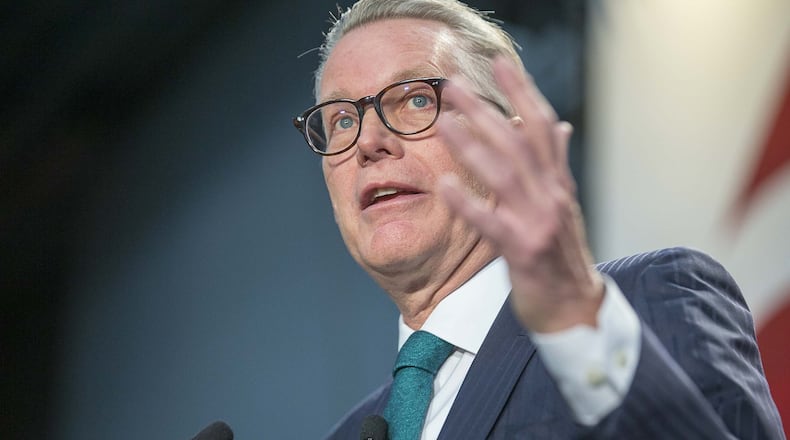Delta Air Lines CEO Ed Bastian earned a salary of $945,833 last year along with stocks and options worth millions more — but the value of his compensation package has declined precipitously with the airline's stock price.
And Bastian is now forgoing six months of salary after the coronavirus pandemic sent air travel plunging.
In an annual filing with the U.S. Securities and Exchange Commission on Wednesday, Delta disclosed that Bastian got a base salary increase from $900,000 to $950,000 effective Feb. 1, 2019, and he got stocks, options and incentives valued earlier at $16 million.
That means the bulk of the compensation Bastian and other top executives receive is mostly dependent on the company's stock price and performance.
Bastian's total compensation increased to $17.3 million in 2019 from $15 million in 2018. But it could take a long time — if ever — for him to collect that kind of money because the 2019 compensation is calculated based on the closing stock price of $50.52 on Feb. 6, 2019 when the awards were granted.
The Atlanta-based airline's passenger traffic has declined to about 5% of normal levels due to COVID-19. Delta's stock price closed at $27.32 on Wednesday, down from $59 at the start of the year.
The stock options only have value if the stock price increases, meaning all stock options paid out to Delta executives that are still outstanding currently have zero intrinsic value, according to the company’s proxy filing. The stock options issued to Bastian and other Delta executives in 2019 don’t expire until 2029, so their value could climb again if Delta’s share price rebounds.
Still, as of now, “the compensation [executives] have received over the past few years is worth significantly less than when it was awarded, declining by more than half of its grant date value,” wrote Delta board member Daniel Carp in a note to shareholders.
Carp added that the board’s compensation committee will need to reevaluate its incentive plans for executives as the pandemic affects long-term business strategies.
As passenger counts began to plummet, Bastian also announced in mid-March that he would forgo his salary for six months from April through September, as would board members.
The company’s officers are taking a 50% pay cut and directors and managing directors are taking a 25% pay cut.
Delta has also cut pay of ground workers and employees at its Atlanta headquarters by 25% through cutting hours.
Delta President Glen Hauenstein and Chief Operating Officer Gil West each had salaries of $700,000 and nearly $10 million in total compensation in 2019 based on the past stock price calculation.
The 2019 total compensation figures hearken back to a heady time last year when the company made a $4.8 billion annual profit, which allowed it to pay $1.6 billion in profit sharing to employees.
This month, as the company reported a $534 million first-quarter loss, Bastian warned employees that Delta does not expect to pay out profit sharing to employees for 2020 results.
In a note to shareholders in the company’s proxy filing, Bastian wrote that “we could have never predicted just how quickly the COVID-19 pandemic would upend our plans and reset expectations for the year, as demand for near-term air travel dropped to almost zero in a matter of weeks.”
The airline is parking more than half of its fleet and announced Thursday it is retiring its MD-88 and MD-90 aircraft in June.
By raising capital including taking on more debt and getting aid from the federal CARES Act, Delta expects to have more than $12 billion in cash by the end of June, allowing it to stay above $5 billion in liquidity throughout the year, according to Bastian.
“While borrowed money will tide us over in the near-term, we have had to put up many of our prized franchise assets – our New York, Washington, D.C. and London slots, among others – as collateral to secure the loan. And the high level of debt will be a burden on our future growth,” Bastian wrote in a memo to employees Thursday.
The company just raised $5 billion in additional debt financing this week, and submitted an application for $4.6 billion in airline loans from the CARES Act. The company has until September to accept the funding, and will only do so if it needs to add to its cash position, according to Bastian.
“We all hope this period will end soon, but we must be realistic that the timing and shape of revenue recovery are uncertain,” he wrote to shareholders.
About the Author
Keep Reading
The Latest
Featured



